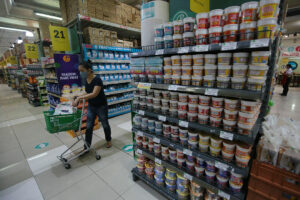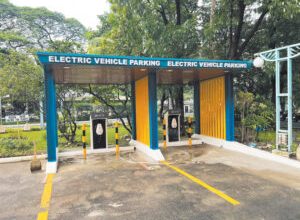BSP has room to raise rates — IMF

By Keisha B. Ta-asan
THE BANGKO SENTRAL ng Pilipinas (BSP) has room to raise rates without derailing economic recovery, the International Monetary Fund (IMF) said.
“Considering the strength of GDP (gross domestic product) growth — as observed in the first quarter of 2022 — raising interest rates to contain inflationary pressures and thwart second-round effects on domestic prices is warranted,” IMF Representative to the Philippines Ragnar Gudmundsson said in an e-mail interview.
“With a policy rate at 2.5% and yearly inflation projected to run at about 5%, there is room to raise interest rates without undermining credit growth and the ongoing economic recovery,” he added.
The economy expanded by a faster-than-expected 8.3% in the first quarter of 2022. Economic managers are targeting 6.5-7.5% gross domestic product (GDP) growth this year.
Inflation rose 6.1% year on year in June, exceeding the central bank’s 2-4 target band for a third straight month. The average inflation rate in the first six months is 4.4%, still below the BSP’s full-year forecast of 5%.
The Monetary Board has raised benchmark interest rates by a total of 50 basis points (bps) so far this year via 25-bp hikes at its May 19 and June 23 meetings, which brought the policy rate to 2.5%.
BSP Governor Felipe M. Medalla last Thursday said they are ready to take more aggressive policy action amid rising inflation and currency pressures. The peso breached the P56 level against the US dollar last week.
“In particular, BSP is prepared to raise its policy rate by 50 bps by August. The BSP is ready to take further policy actions, if needed,” Mr. Medalla said.
UNCERTAINTYThe IMF’s Mr. Gudmundsson said monetary policy tightening and supporting economic growth “are compatible, not least in terms of ensuring the sustainability of growth.”
However, the outlook for the global economy is now clouded by the Russia-Ukraine war, a slowdown in China, and the monetary policy tightening in the United States, he said.
“Tighter global financial conditions do pose risks related to higher volatility for the emerging economies. Fortunately, the impact is somewhat mitigated in the Philippines by the flexible exchange rate and relatively low non-resident portfolio investment,” Mr. Gudmundsson said.
He noted the Philippines is “well-positioned to withstand external shocks,” as its economy is one of the fastest-growing in the region and has adequate foreign exchange reserves.
“Looking forward, it will be important to continue to adhere to sound macroeconomic policies, to rebuild buffers through gradual fiscal consolidation, to attract foreign investment, and to promote green and inclusive growth,” Mr. Gudmundsson said.
‘STILL LOW’Finance Secretary and former BSP Governor Benjamin E. Diokno said that even with the central bank’s planned rate hikes, it will still be lower than the pre-pandemic policy rate of 4%.
“With Governor Medalla’s forward guidance, we will increase it by (50 bps) which will bring it to 3%. That will still be lower than where we came from. I think we should not panic that it is rising. It’s gradual,” Mr. Diokno said during a press briefing after the Development Budget Coordination Committee (DBCC) meeting on Friday.
“All of this is calculated so as to not jeopardize economic growth while at the same time, making sure that over the medium-term, inflation is brought back to within the target band,” BSP Deputy Governor Francisco G. Dakila, Jr. added.
At its June 23 meeting, the BSP raised its inflation forecast for 2022 and 2023 to 5% and 4.2%, respectively, taking into account higher oil and commodity prices.
The DBCC on Friday said the average inflation rate assumption was raised to 4.5-5.5% for 2022, from 3.7-4.7% previously, reflecting the impact of soaring transport, fuel, and food expenses.
It expects inflation to ease to 2.5-4.5 % in 2023, before returning to the 2-4% target range starting 2024 to 2028.
Former BSP Deputy Governor Diwa C. Guinigundo said monetary tightening will not necessarily have a large impact on economic activity.
“The Philippines is poised for some good recovery starting in the first quarter of the year. Even if the BSP should decide to tighten monetary policy to gain more traction in the event of another shock, the economy is robust enough to withstand more aggressive monetary action,” Mr. Guinigundo said in his July 8 column published in BusinessWorld.
But with rising inflation, Mr. Guinigundo said it was right for Mr. Medalla to embrace a more aggressive monetary policy.
“The BSP that we are seeing today has taken those baby steps, communicated its policy intent that is conditional to sustained price increases and exchange rate volatilities, and conveyed that it’s now on a warpath against inflation,” Mr. Guinigundo said.




